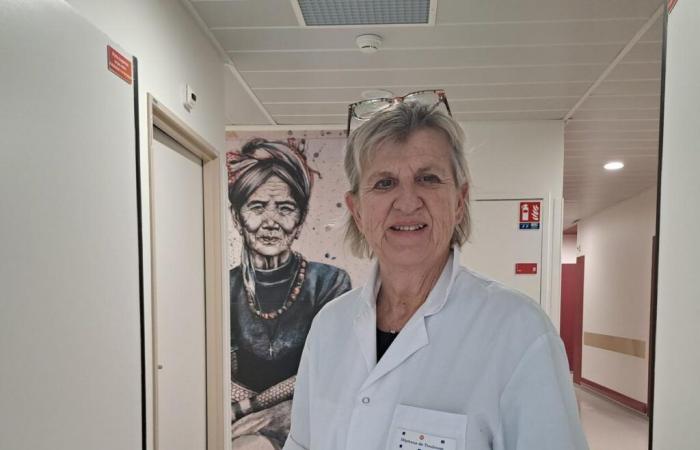In Toulouse, its service welcomes no less than 3,000 patients each year. The consultation schedule is full until June. This Friday, Aurélie Chourreau, 45, is relieved: she will, perhaps, finally be able to say goodbye to her hot flashes. “I have undergone two gynecological operations. Since then, I have no longer had periods, but terrible night sweats, not to mention the rest: insomnia, fatigue, joint pain and weight gain,” she confides to Christelle Moreau, the nurse on the front line of the reception of patients.
Christelle listens, smiles, reassures: these symptoms are characteristic of disorders that can occur several years before menopause, “this is what we call perimenopause. Menopause is defined by the total cessation of menstruation for one year. But this is perhaps not yet the case for Aurélie, who is a little young: 90% of the time, she intervenes between 49 and 52 years old. “We will take stock to find out where you are,” concludes the nurse.
“Aging in good health”
Here, Aurélie will not hear “maybe”. She will have precise answers. At the first appointment, each patient does a complete assessment: taking measurements, blood test, and densitometry to photograph the condition of the bones. Objective: to assess the risks of subsequent illnesses, “bone, metabolic, cardiac problems”, says Christelle Moreau.
It is also an opportunity to do “therapeutic education”: at 50, a healthy lifestyle is no longer an option. Exit tobacco. “At equivalent consumption, at this age, women have a 50% greater risk than men of having a heart attack,” explains Florence Trémollieres. Eat less and better, move more, avoid alcohol… “My mission is to support women so that they can age in good health. And there are solutions,” says the doctor. Hormonal or alternative, such as hypnotherapy offered at the center. Solutions to choose according to their needs and desires. “We have to listen to women,” slips the professor.
1986: birth of the menopause center
The menopause and osteoporosis prevention center: an innovative center that offers comprehensive care. Each year 3,000 patients are welcomed
HEAR FERBOS
She has been listening to them for forty years. Auscult them. Reassures them. Initially, it was “a combination of circumstances” that brought Florence Trémollieres into the gown of Madame Menopause. Or rather the meeting with Professor Ribot, endocrinologist. By doing research, this doctor discovered that “beyond secondary osteoporosis linked to endocrine diseases – such as thyroid problems – the main cause of osteoporosis in women is menopause. » Since then, he has continued to unwind the thread of “women’s health”. Thus, in 1986, he created the menopause center, combining the skills of a rheumatologist and the gynecologist Françoise Trémollieres, his former trainee, who retired and took over the management of the service.
In 2025, the Toulouse center is still the only one in France to offer a dedicated service staffed by four doctors, a nurse and interns. But no one dares to ask the professor anymore if she has nothing better to do than “take care of good women”…
Early menopause: right from wrong
FAKE. The term premature ovarian failure (POI) is reserved for cases of menopause occurring before the age of 40. Between the ages of 40 and the usual age of 49-51, we speak of early or anticipated menopause.
-“Hello ? It’s the Élysée”
Nevertheless, when in the spring of 2024, her phone rings, Françoise Trémollieres does not expect to have the Élysée on the line. Yes, of course, she agrees to participate in the parliamentary mission on menopause. There is still much to do. “Menopause is not an illness (unless it occurs before the age of 40), it is a normal, physiological stage in the life of 100% of women. They will even spend thirty years of their existence in menopause. There is therefore no reason to make them socially invisible,” the doctor begins.
Women will spend thirty years of their lives in menopause: a third of their existence
However, it is essential to “screen”, she says. Because estrogen deficiency caused by the cessation of the functioning of the ovaries can promote certain pathologies. The risk of having an osteoporosis fracture is 40%; that of dying from cardiovascular disease is 45%. It’s huge,” she comments.
Hence the importance, depending on the results of the examinations, of prescribing hormonal treatment for menopause. “We absolutely must demonize this treatment: it is now established that this cocktail of 17-beta-estradiol and progesterones, taken between the ages of 50 and 60, in the form of a cream, brings more benefits than risks. »

Risk of meningioma and progestins in oral contraception: the data are reassuring
On December 18, 2024, the EPI-PHARE scientific interest group bringing together the National Health Insurance Fund (CNAM) and the National Medicines Safety Agency (ANSM) presented the results of its latest study “Oral contraception and risk meningioma” on the risk of occurrence of this generally benign tumor of the meninges (membranes enveloping the brain and spinal cord) linked to exposure to a progestin in contraception oral.
30 symptoms: dry skin, bloating, etc.
Since menopause is not an illness, “the gateway is quality of life”. Most often, it is indeed well-being that is impaired. “According to the survey we conducted in 2021, 87% of women between 50 and 65 years old have at least one symptom of menopause, and 93% between 50 and 54 years old. » No less than thirty other inconveniences are now attributed to this period: skin or vaginal dryness, brain fog, repeated urinary infections, palpitations, mood swings, digestive bloating, etc.
To be relieved, many of them cross France. But soon, other dedicated centers should open, like the Toulouse site: in Paris, at the Chu de Bordeaux, and Bayonne.








